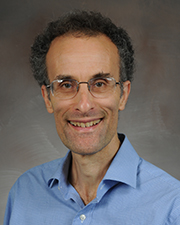Margolin Lab

William Margolin, Ph.D.
To visit the Margolin Lab website, please visit www.margolinlab.org.
Cell division, or cytokinesis, is a fundamental requirement for the proliferation of all cells. Cytokinesis is regulated temporally and spatially to insure that daughter cells contain the normal complement of chromosomes. We study the regulation of cell division in bacteria, which enables us to use highly sophisticated genetic approaches. Despite our vast knowledge of prokaryotic biology, we still understand surprisingly little about how bacteria, such as Escherichia coli, divide by binary fission.
One of the cell division proteins we focus on is FtsZ. FtsZ is an abundant protein that, in response to an unknown signal, polymerizes into a ring structure marking the division site and is essential for the initiation of cell division. Other essential proteins, such as FtsA and FtsK, are then recruited to the FtsZ ring and act in a putative complex to complete division. FtsZ is ubiquitous, with homologs in eubacteria, archaea and chloroplasts. Current evidence suggests that FtsZ is essential to define the cell division plane in all non-nucleated cells. What has made working on these protein even more exciting is that FtsZ and FtsA are homologs of the eukaryotic cytoskeletal proteins tubulin and actin, respectively. In the last few years we have focused particularly on FtsA, as it seems to be a key regulator of the FtsZ ring.
Our long-term goals are to understand how FtsZ and other cell cycle proteins target precisely to the division site, do so only once per cell division cycle, and achieve the constrictive force necessary for cytokinesis. We are also interested in the diversity of cell division mechanisms among microorganisms.